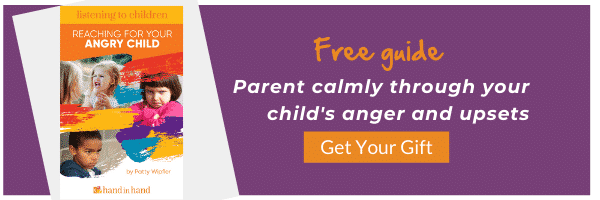Children are loud, funny, passionate people. This we know. And while none of us go into parenting hoping our kids will not get on with their siblings or friends, some teasing, squabbling and competing is normal and to be expected.
Still it isn't always easy to listen to upset children, and how we react in the moment can have a significant impact on how family life unfolds.
Here at Hand in Hand, we know that when children are upset, getting that upset out of the way is a natural smart and healthy process. When a child is upset, feelings flood their brain's limbic system, effectively shutting down good thinking and reasoning as emotion takes over.
When children offload this upset through crying, tantrums, trembling, perspiring, or laughing, things soon come back into balance. Thinking and reasoning return, which means that you can begin to talk and laugh with your child again. Your child is free to think clearly and make good choices.
Parents can support the child during this cleansing process by moving in and listening with warmth and full attention. Through our body language, calm voice and brief but reassuring words, we make it clear that we know they are good and that we will support their process.
This response has an anchoring effect.
It creates a feeling of space and containment that helps children to feel secure enough to offload their feelings. From there, they can recover and move on with their day. On the other side of the emotional storm, sticky behaviour often evaporates. You'll see that kids will share, problem-solve and co-operate more easily and happily.
We call this process of an adult listening to a child’s feelings Staylistening. It can be wonderful to see it unfold.
Words and phrases to help: Staylistening with more than one child
And yet, it can become difficult to listen when more than one child is upset. If one child has hurt another, both may need your attention at the same time. Sometimes when parents Staylisten with one child, the warmth and attention upsets another child who feels somehow neglected or unseen.
Your attention becomes divided as conflicting feelings rise up about who you should listen to in each moment. You might wonder whether it’s even possible to listen to more than one child. Should you rotate between children, or attempt to bring them together?
Juggling the big feelings of more than one person stretches you too, making it harder to remain warm and attentive to all who need it. What if your own feelings flare when so much seems to be at stake?
Have you ever had to Staylisten to more than one child and felt a little lost? Then read on.
These ideas from Hand in Hand Parenting's founder Patty Wipfler address concerns that crop up for many parents when they face the difficult task of Staylistening with more than one child. We hope it helps you when multiple upsets break out in your house.
Words to say when children are upset at the same time
These words can reassure children, when more than one child is upset at the same time.
- “I don't think he's going to cry forever.”
- “I don't think it's going to feel this bad forever.”
- “She's going to heal just fine.”
- “You two are going to figure out a good solution.”
- “He's going to be feeling better soon.”
- “Good feelings will come back. And I'll stay with you until that happens.”
- “Crying gets the sad out, and the mad out. He's doing a good job/You're both doing a good job.”
- “It feels like a long time, I know. But I'll be able to snuggle with you soon.”
- “Your sister loves you, but she can't think right now.
- “I'm here loving you. Nothing can stop me from loving you.”
- “I see you, I see this is hard. It will be over soon, and then we can play.”
- “Thank you for waiting. It's not easy!”
- “You both are smart. I know you can figure this out.”
When one child has hurt another
Children don’t want to hurt others. But they do get disconnected and scared, and at those times behaviors happen that they don’t have much control over.
Don’t let a distant attitude fool you. Consumed with guilt, your child may put on a mask. They may run away, yell, throw themselves face down, or act like they don't care at all.
But know this. Your child aches because of what just happened. And a child who has hurt another needs a warm connection with you more than ever.
Try these words to soothe and comfort:
- “I'm sorry I didn't get here sooner to help you.”
- “I'm sorry I didn't see that you were having some trouble. I want to help you when you aren't feeling good.”
- “Oh, you are my good, good girls. Your hearts are good, through and through.”
- To the child who was hurt: ” They didn't mean to hurt you. They weren’t feeling good at that moment, but they love you. They don't want to hurt you.”
This post has many more ideas about what you can do and say when your kids argue and fight. Read Sibling Fighting: When You Get There Too Late.
When Staylistening with one child affects another
When one child is wailing away and you want to Staylisten, you may find that another child feels left out and begins to demand your attention too. “They either act out or sink into a passive state of semi-misery,” says Patty.
This can be surprising and confusing! If another child is showing that they need to be heard too then it can help to work on the feelings you have about this. It can be hard seeing them go into rigid behaviors or into feeling unloved, unwanted and uncared-for when you are pouring so much attention into the situation already.
Here are some ways you could give the left out child options for getting a small measure of your attention:
- “You can come and climb onto my back while Freddie is crying.”
- “If you can come over here, I'll put one arm around you until she's finished her big cry.”
- “He's not going to cry forever. When he's done, we'll be able to play. I'm sorry it's hard to wait.”
- “I see you, Georgie. I can't talk much right now, but I see you, and I love you. I'll be free soon, but I'm not sure exactly when…'
- Ask the left out child if they want to come and help you listen to their sibling. “Here's a place for you right here. Your brother would love it if you listened to him, but if you don't want to, I am doing it. And he will recover fine, either way
Keep up your regular Special Time practice, and any Staylistening called for when Special Time ends. This will gradually lower the amount of un-worked-through feelings each child carries.
How to Staylisten when children can't share
Staylistening when more than one child can't agree
Ideas to keep your perspective bright
Choose words to help you stay anchored in this perspective. It can be helpful to murmur a mantra like, “You are good. I'm right here. I am with you, and you are safe,” or, “You are good. I am with you. It will be better soon…”
Gently using the same phrase is centering for you and your children.
All that sharp screaming disrupting your attention? Give noise-canceling headphones or earplugs a try.
Don't push for apologies
Trust that your children know how to repair their relationships. Forced apologies can backfire, moving kids back into upset. Try not to blame or assign shame. What you know is that a child didn't feel good and behavior happened. As long as you lift blame or ideas of blame out of the situation, children know exactly how to repair a relationship, and often both children are eager for this.
“I remember one of my sons being hard on and hurting the other,” says Patty. “I listened while the one who was hurt cried, and I did not urge his brother to apologize, or anything.”
She assured the hurt one that his brother was good, and apologized that she hadn't intercepted in time to help,. She told her son that his brother loved him and then let things go when the hurt child stopped crying and resumed play.
“Within a half hour, I saw the brother who had been aggressive go to the room where his younger brother was playing, and strike up a game with him, making his brother laugh. The older one figured out how to repair the relationship without a single word from me.”
“I have seen this again and again,” Patty says.
Staylistening with more than one child: final thoughts
When two or more children are upset at once it can be overwhelming. But it is possible to hear more than one child. And it is possible for children to use your attention, even when it is divided, to support them as they offload their feelings and re-balance.
If it feels hard, we encourage you to find a Listening Partner to give you the gift of listening. And we hope these words and phrases help in the moment, when you find yourself Staylistening with more than one child.
Tell us your favourites, and how they work out for you. Figure out what drives your child's anger and how to help them regulate and find calm. It's all in our free guide. Get it now.

